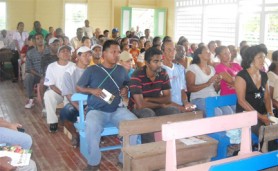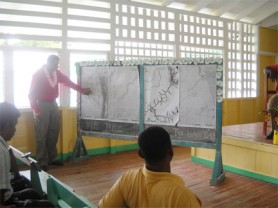In the face of increased flooding, a project to open up 4,500 acres of land for farming was yesterday unveiled to Pomeroon farmers at Siriki, Pomeroon River.

The Essequibo Land Development Project will see 450 ten-acre plots of lands being opened up at Siriki and Warapana on the Pomeroon and Onderneeming on the Essequibo Coast, said Enrique Monize, Manager – Land Administration at the Guyana Lands and Surveys Commission (GLSC). It will be available to those who need it and want to engage in agricultural activity, he said. The GLSC will commence a Cadastral Survey to identify and map out the plots and record the data on an information system. This exercise is slated to be completed by the end of this year.
Each plot will be ten acres in size: 150 plots will be available at Warapana, 200 at Siriki and 100 at Onderneeming. Leases will run for 50 years. Monize said that once the land is developed and occupied, it can be transferred, including for inheritance. “We need to see beneficial occupation,” he said, adding that this is among the main conditions and will be monitored.
“Your traditional farmlands are under threat,” Agriculture Minister, Robert Persaud told the residents at the meeting at the Siriki Primary School. Other officials, including Region Two Chairman Ally Baksh, had earlier said that there are serious problems in terms of flooding in the area, particularly when the mouth of the river is “choked”. Baksh said that farmers should look to moving to higher grounds away from the lowlands. PPP General Secretary Donald Ramotar also said they are conscious that Pomeroon has more than its share of flooding.

Currently, some areas in the Pomeroon, including Akawini, are experiencing flooding, some residents told this newspaper.
Persaud said that Guyana is unique in terms of vulnerability, particularly as it relates to climate change.
He pointed out that Pomeroon residents face this reality daily. Saying that agriculture is central to residents’ existence, he said that over the last two and a half years government spent over $160M in this sector in the Pomeroon.
The minister pointed out that their traditional farmlands are under threat and said that they will be reallocating and even shifting to land that can be better protected. According to a brief on the project, the Agriculture Diversification programme and the Grow More food campaign have seen a positive nationwide response and therefore there exists need for the development of agricultural land.
The brief points out that the Essequibo region, especially along the Pomeroon River, has great potential for the production of non-traditional agricultural products. Additional access to the Trinidad market for over 20 agricultural products and other potential markets for non-traditional products will require more lands to be able to satisfy demand, it said. “The development of rural areas will provide opportunities for an improvement in income and a reduction of poverty and increased food security. Apart from this, with the increase in opportunities for employment and development within the rural areas, there will be a more stable social and economic environment,” it added.
Consequently, the brief explained, there exists the possibility of a reduction of criminal activities and disruption of family lives caused by family members having to leave their villages to earn their living in the mining and forestry areas and in urban areas. It pointed out that lands exist at Warapana, Siriki and Onderneeming that can be developed for agricultural lands. However, for these lands to be developed, they have to be surveyed and placed in lots and be regularized before they can be allocated to farmers. “It should be noted that many farmers are currently cultivating lands that are extremely low lying and this results in the constant flooding. Some of these farmers are expected to benefit from this project by being allocated lands,” said the Ministry. It said that in their regular activities, they have completed 87 ten-acre plots in the Onderneeming area and the distribution is ongoing currently. However, with the immediate need to survey and regularize the other areas there would be need for additional funds to be allocated for this purpose. The overall cost of the project is estimated at $36M.
Leapfrog
Meantime, Persaud said that he hoped to see increased production and services such as testing the land through the Ministry’s various institutions will be provided. According to him, the new agriculture being aimed for is using new science and technology and transforming the way agriculture is done. “We want to get the best, we want to get the latest, because we want to leapfrog,” he said.
Persaud added that they no longer want to hear about potential but to make it happen. He said that the Ministry and farmers have to partner and urged them to cooperate. Once the cadastral survey is completed, they will move to land allocation, he said. He told Stabroek News that the project will be an inter-agency effort and priority will be given to farmers who suffer the most from the effects of climate change.
Some residents, in raising issues facing them, highlighted flooding, acoushi ants and lack of land. Michael Griffith said that over the past month, the lower Pomeroon has been affected by flooding and there were several breaches in the river embankments which contributed to this.
He pointed out that farming is what residents depend on and their standard of living has dropped. Julian Melville said that acoushi ants was affecting farmers while Vanessa D’Aguiar said that residents of the Little Red Village had no land to plant crops and when they plant in their yards, the acoushi ants affect them.
She asked whether the Ministry could speed up the process of surveying the land while another resident questioned how long a lease would take to process.
In response, Persaud said that processing the lease should not take more than two months after an allottee is informed which lot has been awarded to that person. This will take place after the cadastral survey is done. He also promised assistance with the acoushi ants and flooding. He acknowledged that there are challenges but said that the activities being done are about improvement, if not for the parents, for their children and grandchildren.
Meantime, Ramotar pointed out that that in the world today many farmers want to move away from the sector. He pointed out that agriculture is vital but said that it must be able to give people a good quality of life.
He said that the government is trying to improve crops and also trying to introduce crops that would not perish quickly.
In speaking on other topics, he alluded to other problems being faced, including that “our world will soon not have places for an uneducated little boy or girl”. He also spoke on “children making children.” Ramotar said that very often some families “make too much children because the nights are too long.” He was speaking in the context of some communities not having electricity and the provision of this through solar power would, he said, act as “an automatic birth control.”




